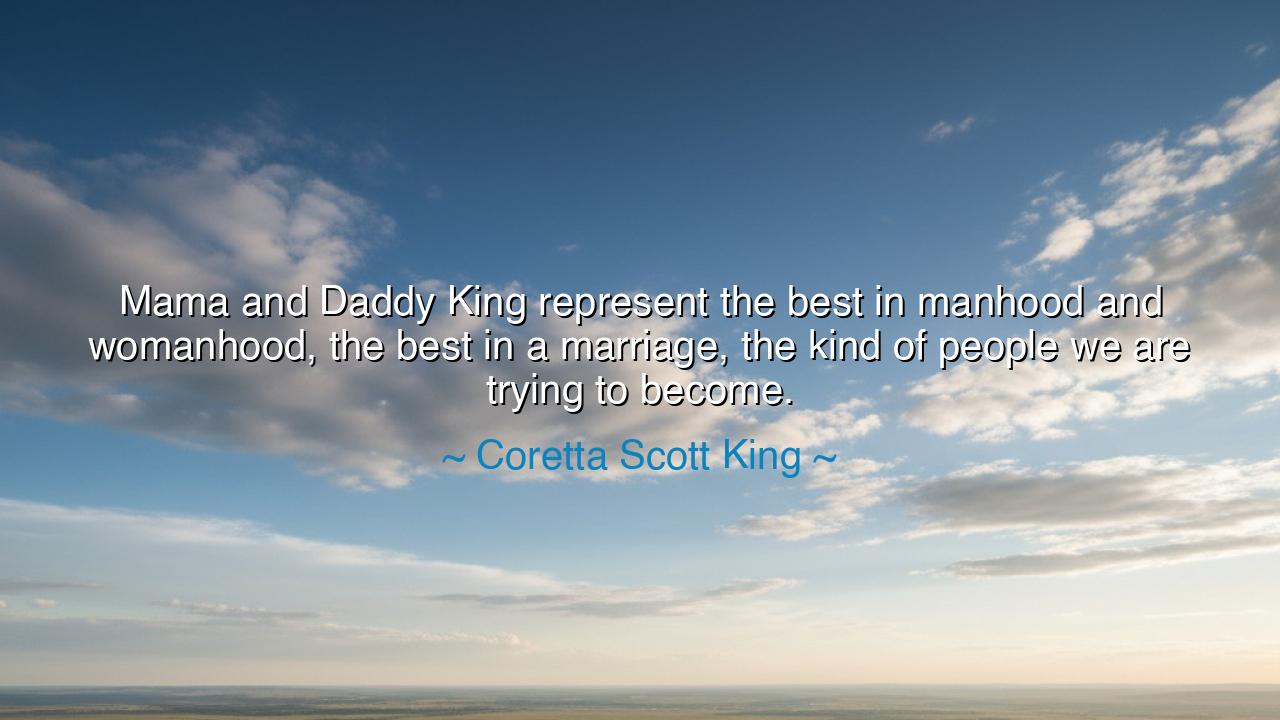
Mama and Daddy King represent the best in manhood and womanhood
Mama and Daddy King represent the best in manhood and womanhood, the best in a marriage, the kind of people we are trying to become.






In the grand tapestry of human history, few partnerships have embodied the essence of love, strength, and commitment more powerfully than that of Mama and Daddy King, as remembered by Coretta Scott King. Her words, "Mama and Daddy King represent the best in manhood and womanhood, the best in a marriage, the kind of people we are trying to become," echo the timeless ideals of dignity, respect, and unity that should guide every human relationship. These words are not merely a reflection of an individual's love for her parents, but a call to embrace the noble qualities that Martin Luther King Jr. and Coretta themselves exemplified—qualities of grace, perseverance, and mutual respect. Their union was not only a personal one, but a model for all, showing that the strength of a marriage lies not in perfection but in the shared commitment to love and purpose.
In the ancient world, the ideal of marriage was often framed as a union that reflected both spiritual and social ideals. Plato, in his work The Symposium, explored the concept of love not just as an emotional bond, but as a philosophical and ethical pursuit. For him, true love was a union that transcended the physical and entered into the realm of the soul, where the two partners uplifted each other in the pursuit of wisdom, virtue, and goodness. Coretta Scott King’s reflection on her parents' marriage mirrors this ancient understanding—what made their union strong was not only their deep affection for one another but their shared commitment to a higher purpose: the fight for justice, equality, and the freedom of all people. The Kings embodied the ancient truth that a marriage, at its highest form, is one that unites both the heart and the spirit in the pursuit of something greater than the individuals themselves.
Consider the story of the ancient Greek hero Odysseus and his wife Penelope, whose marriage was defined not by constant proximity but by mutual respect and a shared sense of purpose. Penelope, as the wife of Odysseus, demonstrated unparalleled loyalty, patience, and wisdom as she awaited his return from the Trojan War, fending off suitors and maintaining the integrity of her household. Odysseus, in turn, although often distracted by his adventures, carried the memory of Penelope’s loyalty as a guiding light throughout his journey. Their marriage became symbolic of the ideal union—one that endures despite hardship, distance, and time. Like the Kings, Odysseus and Penelope represent the best of manhood and womanhood, a union that transcends personal interest for the greater good of family and community.
When we look at the legacy of Martin Luther King Jr. and Coretta Scott King, we see that their marriage, like that of Odysseus and Penelope, was not simply a personal bond but a partnership that embodied the highest ideals of humanity. Coretta was not just the supportive wife of a leader; she was a force in her own right, advocating for civil rights and justice alongside her husband. Together, they were a dynamic couple whose union represented the strength of shared purpose. Coretta Scott King’s acknowledgment of her parents’ example is a reminder to us all that love, when rooted in shared values and vision, has the power to change the world. The best in manhood and womanhood, as she says, is not found in individual triumphs but in the collective effort to elevate one another and work toward the common good.
Their marriage also speaks to the idea of balance—the balance between individual strength and shared vision, between the masculine and the feminine forces that shape the world. In the context of the civil rights movement, Martin and Coretta’s marriage was one of deep mutual respect, where both partners supported each other’s personal missions while working together toward the larger mission of social change. Theirs was a marriage that did not demand the sacrifice of one’s identity but the enrichment of each other’s strengths, and it was this that allowed them to overcome the many challenges they faced, both as individuals and as a couple.
The lesson of Coretta Scott King’s words is a powerful one: in marriage, the highest calling is not to simply co-exist or to pass time together, but to actively work toward a common goal, to uplift one another and to fight for something greater than the self. The best of manhood and womanhood is not defined by traditional roles or expectations but by the strength and dignity that come from embracing each other as partners in both life and purpose. The King’s marriage was not without struggle or hardship, but it was in their unity—in their ability to rise above individual interests and work toward justice—that their love was truly transformative.
For us, the lesson is clear: let our marriages be not just about personal fulfillment, but about shared growth and purpose. Let us elevate each other in the pursuit of justice, equality, and freedom, just as Martin Luther King Jr. and Coretta Scott King did. The best of manhood and womanhood does not lie in perfection, but in the deep commitment to grow together, to challenge each other, and to fight for a world where love, respect, and human dignity prevail. Let us create unions that inspire not only those within them but the world around us—marriages that, like the Kings’, become symbols of hope and transformation for generations to come.






AAdministratorAdministrator
Welcome, honored guests. Please leave a comment, we will respond soon